Clancy Tucker's Blog, page 243
October 21, 2015
22 October 2015 - WHY IS PURPLE CONSIDERED THE COLOUR OF ROYALTY?

WHY IS PURPLE CONSIDERED THE COLOUR OF ROYALTY?
G'day folks,
Yet again, I'm answering a question that has been on your mind for ages.
The color purple’s ties to kings and queens date back to ancient world, where it was prized for its bold hues and often reserved for the upper crust. The Persian king Cyrus adopted a purple tunic as his royal uniform, and some Roman emperors forbid their citizens from wearing purple clothing under penalty of death. Purple was especially revered in the Byzantine Empire. Its rulers wore flowing purple robes and signed their edicts in purple ink, and their children were described as being “born in the purple.”
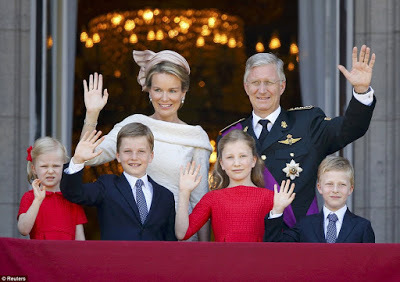
The reason for purple’s regal reputation comes down to a simple case of supply and demand. For centuries, the purple dye trade was centered in the ancient Phoenician city of Tyre in modern day Lebanon. The Phoenicians’ “Tyrian purple” came from a species of sea snail now known as Bolinus brandaris, and it was so exceedingly rare that it became worth its weight in gold. To harvest it, dye-makers had to crack open the snail’s shell, extract a purple-producing mucus and expose it to sunlight for a precise amount of time. It took as many as 250,000 mollusks to yield just one ounce of usable dye, but the result was a vibrant and long-lasting shade of purple.

Clothes made from the dye were exorbitantly expensive—a pound of purple wool cost more than most people earned in a year—so they naturally became the calling card of the rich and powerful. It also didn’t hurt that Tyrian purple was said to resemble the color of clotted blood—a shade that supposedly carried divine connotations. The royal class’ purple monopoly finally waned after the fall of the Byzantine empire in the 15th century, but the color didn’t become more widely available until the 1850s, when the first synthetic dyes hit the market.

Clancy's comment: Right, now you know. Happy? Great. I knew you would be.
I'm ...
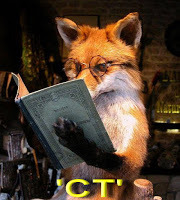

Published on October 21, 2015 02:50
October 20, 2015
21 October 2015 - LONGY HAN - Guest Author

LONGY HAN
- Guest Author -
G'day folks,
Welcome to my interview with a well-travelled author who works as a lawyer during the day and writes great stories at night.
Welcome Longy ...
1. TELL US A LITTLE ABOUT YOURSELF. WHAT GENRE DO YOU WRITE?
Lawyer by day, children's book writer by night.
Naturally curious and mildly adventurous, I have travelled independently across 7 continents, over 30 countries and 90 cities mostly on a shoestring budget.
2. WHAT MOTIVATED YOU TO BECOME A WRITER?
Having travelled quite extensively, I really wanted to share travel stories as a way to inspire curiosity, to spread happiness and to provide kids who haven’t travelled an opportunity to “experience” the world in the comfort of their homes. That's the main reason why I started writing the Curious Travels of Gusto & Gecko series.
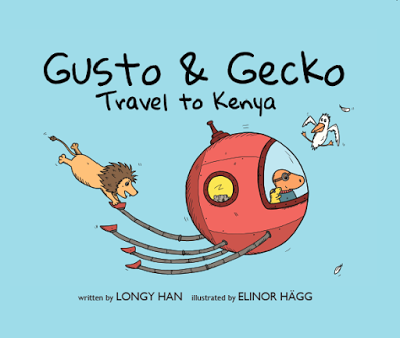
3. WHAT TYPE OF PREPARATION DO YOU DO FOR A MANUSCRIPT? DO YOU PLAN EVERYTHING FIRST OR JUST SHOOT FROM THE HIP?
For Gusto and Gecko travel to Kenya, I wrote the story in dot points, padded it out, finalised at least five drafts. Then one day out of the blue, I re-wrote the entire story under two hours (and the manuscript pretty much stayed that way).
4. WHAT ARE YOU WORKING ON AT THE MOMENT?
The second and third book in the Curious Travels of Gusto & Gecko series - Gusto & Gecko travel to New Orleans and Gusto & Gecko travel to China!
5. HOW DO YOU PICK THE COUNTRIES TO WRITE ABOUT?
That's the first question people always ask! Honestly, I had no idea which country I should write about first because they are just so many incredible places in the world. It caused me so much headache that I eventually decided to just write in the order of the countries that I visited. So it was Kenya, then New Orleans (USA), China and so forth.
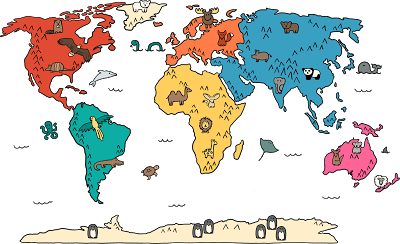
6. WHAT ARE YOUR PLANS FOR THE FUTURE?
Eradicate illiteracy in the world.
I believe literacy lays the foundation for lifelong learning and it is a tool of personal empowerment. Being able to read and have access to good books can play a big part in introducing kids to new ideas, broadening their horizons and fostering better understanding of the big world. As their capacity to read grows, so will their understanding and appreciation of the different cultures, traditions and people around them.
One of the four pillars of the Gusto & Geckoseries is to give back to the community. For the first book, I donated $1,000 to the Indigenous Literacy Foundation, an Australian charity dedicated to raising literacy levels amongst indigenous children living in remote and isolated areas in Australia. I also committed to book donations to major Australian children’s hospitals, the National Centre of Indigenous Excellence, primary schools and kindergartens. I want to be able to do more of this in the future.
7. HOW MUCH THOUGHT GOES INTO DESIGNING A BOOK COVER?
For us, designing a book cover was surprisingly straightforward - we picked out the coolest thing in the book then attached it to the most ridiculous thing in the book! Whilst the idea of having a lion dangle off a travel machine is a little bizarre, Elli (my illustrator) did such a fantastic job that readers have embraced the design. I can't brag enough about how awesome Elli is. This book would not be where it is today without her invaluable contributions.
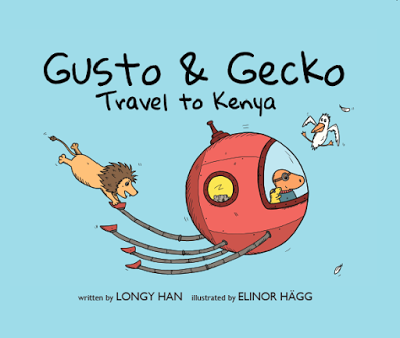
8. WHAT’S YOUR ULTIMATE DREAM?
I dream of one day rocketing to the moon with a wardrobe full of pastries and playing fetch with my humongous, drooling, happy husky on a lunar crater.
9. WHAT IS THE TITLE OF THE LAST BOOK YOU READ? GOOD ONE?
Delivering Happiness (2010) by Zappos CEO Tony Hsieh. It's very good!
Q: HOW WOULD YOU DEFINE 'success' AS A WRITER?
A: Success means different things for different people. To me, if my writing lingers in the mind of readers, if it inspires curiosity or teaches them something new then I would feel very content. After a successful book launch at Dymocks Sydney store, Longy is already planning a sequel to her book. She has returned to the crowdfunding platform and is looking to achieve more with less. Her funding target is $8k and when you purchase a book via the campaign, she will donate a book to a kid in need. So if you are interested in her project and in promoting literacy, please check out: https://www.kickstarter.com/projects/1363765039/gusto-and-gecko-travel-to-new-orleans and join her on the next exciting adventure!

WEBSITE

Clancy's comment: Go, Longy! Well done. Keep travelling and writing. They are two great things to do in life. Mm ... Not too sure about that trip to the moon.
I'm ...


Published on October 20, 2015 02:18
October 19, 2015
20 October 2015 - SOME GREAT WEIRD STUFF

SOME GREAT WEIRD STUFF
G'day folks,
From time to time I like to scare you and show you what really happens around the world. Brace yourself.
Oh, without sounding like a smartie pants, I've been fortunate enough to receive another 5-Star Amazon review for 'Gunnedah Hero'. Check it out below.





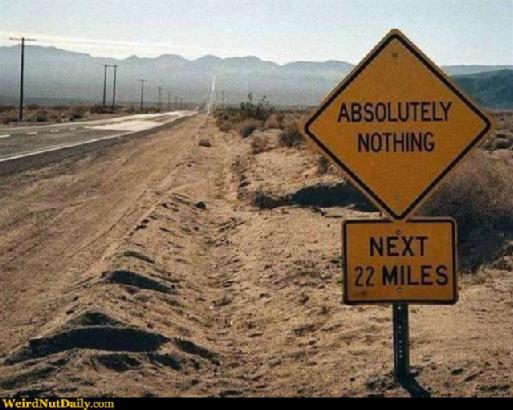


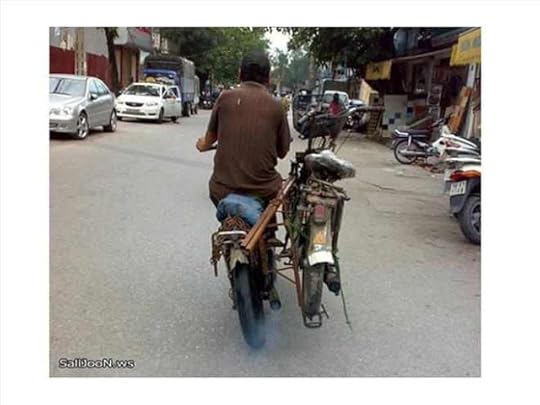








Clancy's comment: Have a chuckle? Recognise anyone you are related to?

5-Star Amazon review for 'Gunnedah Hero' by leading Australian poet, Vicki Case.
A Golden Story & Incredible Read
Australian author - Clancy Tucker has struck gold again with Gunnedah Hero. Once again Clancy takes us on an emotional roller-coaster ride of emotions. Only in Gunnedah Hero, you find yourself riding the big-dipper throughout most of it.
After a crippling snake bite Smokey Danson is sent out onto the long paddock with a small herd of cattle; to save them from certain death from the drought; & the farm from losing their valuable asset - the cattle. This task is made even more difficult because young Smokey is only 14 years-old.
Gunnedah Hero tells his tale; conjointly with Smokey's 14 year old great-great grandson reading his journal. It’s an amazing story of courage; heartbreak; friendship & fulfilled promises. Young Gunnedah (or Gunnie as he is known) has no idea of why he is bequeathed the journal; nor of the path its ownership would ultimately lead him but, much like his ancestor, he is up for the challenge.
Throughout the journal Smokey recounts losing his working dog (Sam), who died saving Smokey from a snake. Smokey has to leave him, but pledges to return & take him home. Smokey encounters ruthless characters; illness; rustlers & more. He also meets & makes lifelong friends; solves a twin murder that is decades old & discovers the value of family; friends & animals.
You will not be able to read this book & not shed a tear. It is masterfully written by a talented author who possesses the incredible ability to tell a story that; not only captivates you from its inaugural page; but one that will stay with you forever. To say that I loved this book would be an understatement. If I could give this book 10 stars out of 5; I would.
Even if you are not Australian, you will love Gunnedah Hero.
Gunnedah Hero would make a great movie.
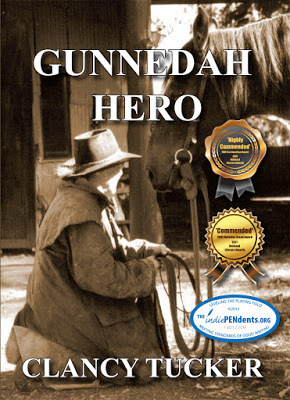
Clancy's comment: Well said, Vicki, and thank you for taking the time to review my book. This book has already won two awards in the Australian National Literary Awards, and we are currently working on a movie. The sequel has already been released, 'A Drover's Blanket', so don't hold back, folks. Spoil yourself and feel what it was like for our forebears who suffered a drought, way back in 1910. All of my books are in paperback or e-Book form. The paperbacks are all signed and come with a matching bookmark.
I'm ...


Published on October 19, 2015 03:29
October 18, 2015
19 October 2015 - THE WORLD'S OLDEST DEMOCRACY

THE WORLD'S OLDEST DEMOCRACY
G'day folks,
Here is a subject that is often mentioned today, and many do not appreciate what it really means because they have always enjoyed it. However, think about those who live without it, and are fighting for it.
Oh, by the way, below is another 5-star review for 'KY!' by Yvonne Elder; an author and one of my greatest supporters. Also, I have a 5-star review for 'Sheeza', by noted Australian poet, Vicki Case, also one of my best supporters.
Thanks, Yvonne. Thank you, Vicki.
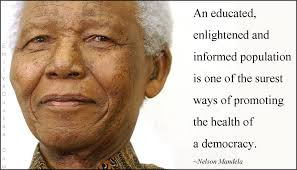
The term democracy, which means “rule by the people,” was coined by the Greeks of ancient Athens to describe their city-state’s system of self-rule, which reached its golden age around 430 B.C. under the skilled orator and politician Pericles. It is probable that the Athenians were not the first group of people to adopt such a system (a few places in India have traditions of local democracy that claim earlier origins) but because the Greeks named it, they have a good claim at being the “first” democracy, even though large portions of Athenian society—most notably women and slaves—could not participate.
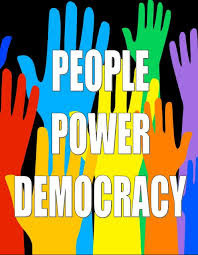
The title of oldest continuously functioning democracy is more hotly contested. Iceland, the Faroe Islands and the Isle of Man all have local parliaments founded in the ninth and 10th centuries, when Vikings pillaged, plundered and set up legislative bodies on the sea-islands of far northern Europe. Iceland’s national parliament, the Althing, dates back to A.D. 930, but it spent centuries under Norwegian and Danish rule. Man and the Faroes, meanwhile, remain dependencies of the United Kingdom and Denmark, respectively.

The United States is among the oldest modern democracies, but it is only the oldest if the criteria are refined to disqualify claimants ranging from Switzerland to San Marino. Some historians suggest that the Native American Six Nations confederacy (Iroquois), which traces its consensus-based government tradition across eight centuries, is the oldest living participatory democracy. Others point out that meaningful democracy only arrived at a national level in 1906, when Finland became the first country to abolish race and gender requirements for both voting and for serving in government.

Clancy's comment: Mm ... Anything worth having is worth fighting for. Don't take it for granted, and always exercise your rights.


5-Star Amazon Review for 'KY!' by author, Yvonne Elder. "KY!" is a lovely, inspirational story about a brave and courageous young girl who discovers what is best in herself by overcoming the bullying of her peers. Just how she does it is the beautiful part, and I had tears in my eyes by the time I finished the story, which I couldn't put down until the end, by the way.
I think this book should be required reading in middle schools across America. It's perfect for grades 6-9, and would inspire many discussions about how to cope with bullying, as well as the key topic of cultural diversity, which runs throughout the story, and is the source of Rida Khalid's bullying in the first place. She is Muslim and she loves to read, which makes her different from the other children at school.
There are many surprises in this story and I will leave them for the reader to discover. "KY!" is also fine reading for any adult.
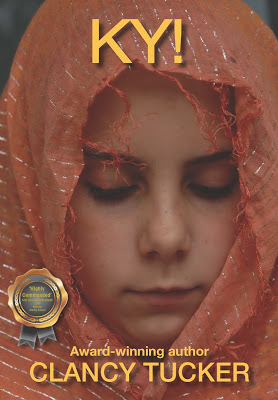
Love ya work, Yvonne! Thank you.

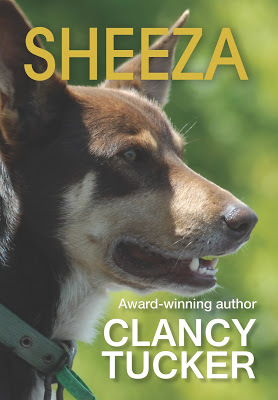
5-Star Amazon Review of 'Sheeza', by Vicki Case. Australia's award winning author - Clancy Tucker, is an exceptional literary talent. He has the ability to captivate your interest & emotions from the inaugural page. He then takes you on the emotional roller-coaster journey his book has in store for you.
Sheeza is no exception. This story absorbed me immediately. I found myself feeling the pain & anguish of a young boy who was struggling to fulfil his dream of owning a kelpie dog. One day fate; & a well-constructed argument with his mother; step in and his dream comes to fruition. His dreams of one day competing in a sheep dog trial with his dog are finally achievable.
However, after a motor vehicle accident, Danny lost his leg & had it replaced with an artificial limb; constricting his movement/s somewhat. The kelpie pup that chose him at the pet shop also had a slight deformity in her leg. Together they formed an incredible bond & trained regularly with their goal in sight.
On their novice attempt they win a sheep dog trial. Then, the selfish act of an individual shatters both their lives when Sheeza is stolen by a truck driver outside the pet shop where she was tied up while Danny paid the final amount he owed the store owner for her. They search & search for months but nothing. Then, one fateful day Sheeza is found many, many miles from home & returned to Dan.
Sheeza had my emotions throughout. I found myself crying tears of joy in some chapters & tears of heartbreak & sorrow in others. I felt as though I was in the story; that it could have easily been me.
I highly recommend this book to everyone. It is a great book that will stay with me forever.
I truly loved this story so much, Clancy. Thank you so much for giving it life. It’s another of your great books that would make an amazing movie.
Love ya work, Vicki!
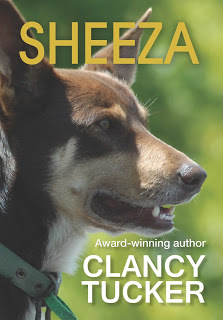
Clancy's comment: There ya go, folks. These two reviews were freely provided by two exceptional women; an author and a poet. So, why not buy them for one of your kids or grandkids for Christmas. Better still, spoil yourself and buy a copy for you. Trust me. They will leave you feeling alive, and glad that you read them.
I'm ...


Published on October 18, 2015 02:11
October 17, 2015
18 October 2015 - HOW WASHINGTON DC GOT ITS NAME

HOW WASHINGTON DCGOT ITS NAME
G'day folks,
Now, I know you've always wanted to know the answer to this question.
Before Washington, D.C., became America’s capital in 1800, the Congress met in a number of different locations, including Baltimore, Trenton and New York City. After years of debate by the new nation’s leaders about the selection of a permanent seat of government, Congress passed the Residence Act in July 1790, which declared that the capital would be situated somewhere along the Potomac River and granted President George Washington the power to choose the final site. The president also was given the authority to appoint three commissioners to oversee the federal city’s development, and a deadline of December 1800 was established for the completion of a legislative hall for Congress and residence for the chief executive.

In January 1791, George Washington announced his choice for the federal district: 100 square miles of land ceded by Maryland and Virginia (in 1846, the Virginia land was returned to the state, shrinking the district by a third). In September 1791, the commissioners named the federal city in honor of Washington and dubbed the district in which it was located the Territory of Columbia. The name Columbia, derived from explorer Christopher Columbus, was used during the American Revolution era as a patriotic reference for the United States (In 1871, the Territory of Columbia officially was renamed District of Columbia.) Meanwhile, in the spring of 1791, the president hired French-born architect and engineer Pierre Charles L’Enfant to lay out the capital city. L’Enfant, who served in the Continental Army during the Revolutionary War, created a design that featured wide avenues and open spaces; however, he clashed with George Washington’s commissioners as well as local landowners and was forced to resign from the project after less than a year. L’Enfant’s design was revised by later planners.

Congress met in Washington for the first time in November 1800 (the man for whom the city was named had died in December of the previous year), and in February 1801 the District of Columbia, which at the time also included the cities of Alexandria and Georgetown, was placed under the control of Congress. Today, America’s capital city has more than 650,000 residents, and they’re represented by a non-voting delegate in the U.S. House of Representatives. The 23rd Amendment gave citizens of D.C. the right to vote for president, starting in 1964, and since 1974 Washingtonians have elected their own mayor and city council.

Clancy's comment: So, now you know. You can rest easy. I've lived in Alexandria and Georgetown and loved it. The latter was a great place to live, and our house was called "Australia House".
I'm ...

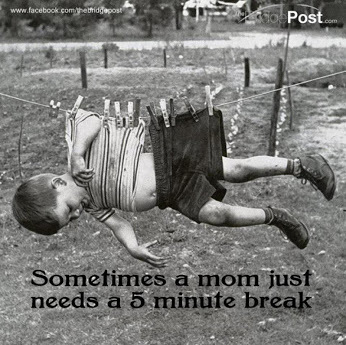
Published on October 17, 2015 03:39
October 16, 2015
17 October 2015 - CATHERINE BROUGHTON - Guest Author
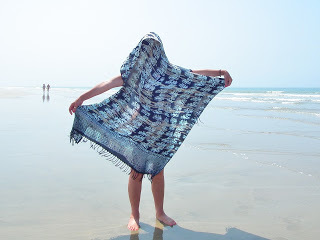
CATHERINE BROUGHTON
- Guest Author -
G'day folks,
Welcome to an interview with an author who runs a successful holiday business in the Charente Maritime, in France, and has four books published with another one due out soon.
Welcome, Catherine ...
1. TELL US A LITTLE ABOUT YOURSELF AND YOUR WRITING JOURNEY.
I have been writing since I was a child. I have always enjoyed it.
2. WHEN AND HOW DID YOU BECOME A WRITER?
My first book was published in 2010. I had tried about 60 or 70 publishers!
3. WHAT TYPE OF PREPARATION DO YOU DO FOR A MANUSCRIPT? DO YOU PLAN EVERYTHING FIRST OR JUST SHOOT FROM THE HIP?
I just shoot from the hip – I love the expression ! My story often changes several times as I write.
4. WHAT DO YOU ENJOY MOST ABOUT BEING A WRITER?
I am a very creative person, so it really suits me.
5. WHAT IS THE HARDEST THING ABOUT BEING A WRITER?
Marketing ! Writing the book is the easy part.

6. WHAT WERE YOU IN A PAST LIFE, BEFORE YOU BECAME A WRITER?
I used to teach French and Spanish in secondary schools, then I had my own real estate business.
7. WHAT IS YOUR GREATEST WRITING ACHIEVEMENT?
“The Man with Green Fingers” is selling well – more about murder than gardening.
8. WHAT ARE YOU WORKING ON AT THE MOMENT?
A collection of short stories
9. WHAT INSPIRES YOU?
Difficult to say … I get a story in my head and then I write it. They are usually triggered by real events.
10. WHAT GENRE DO YOU WRITE?
For women, absolutely.
11. DO YOU HAVE ANY TIPS FOR NEW WRITERS?
Yes, the marketing. Do not count on friends and family but only on your own determination. Friends and family may and may not buy a copy and likewise they may or may not think to share your book on Facebook or Twitter or whatever … but never count on them. They mean well, but somehow they just don’t get round to it …
12. DO YOU SUFFER FROM WRITER’S BLOCK?
No, rarely

13. DO YOU HAVE A PREFERRED WRITING SCHEDULE?
No, I just do what suits, as and when
14. DO YOU HAVE A FAVOURITE WRITING PLACE?
Not really. I jot ideas down off and on all the time, anywhere I happen to be
15. WHAT IS YOUR GREATEST JOY IN WRITING?
I love poetry and get a real pleasure from it
16. WHO IS YOUR FAVOURITE AUTHOR AND WHY?
A French author called Christophe Rufin. I don’t think he has been translated in to English – I don’t know – I read in French.
17. WHAT’S THE GREATEST COMPLIMENT YOU EVER RECEIVED FROM A READER?
“I couldn’t put it down” !!
18. WHAT WAS THE WORST COMMENT FROM A READER?
One woman said it was boring. I don’t mind her finding it boring – clearly for her it was – but I think people who write a bad review just because they didn’t happen to like something (book, hotel, rental) are really rotten and small-minded
19. WRITERS ARE SOMETIMES INFLUENCED BY THINGS THAT HAPPEN IN THEIR OWN LIVES. ARE YOU?
Yes, most of my work is based on true stories.
20. OTHER THAN WRITING, WHAT ELSE DO YOU LOVE?
I do water-colours and enjoy that very much. I also run a holiday business in France and that is satisfying.
21. DID YOU HAVE YOUR BOOK / BOOKS PROFESSIONALLY EDITED BEFORE PUBLICATION?
The first two were … but there were still mistakes and even my English spelling corrected in to Amercian spelling !!

22. DESCRIBE YOUR PERFECT DAY.
Tea in bed in the morning, shopping with my daughter, wine and supper in front of the TV in the evening … it doesn’t necessarily include writing.
23. IF YOU WERE STUCK ON A DESERT ISLAND WITH ONE PERSON, WHO WOULD IT BE? WHY?
Paul Mckenna – I’d love to spend time with him.
24. WHAT WOULD YOU SAY IF YOU HAD THE CHANCE TO SPEAK TO WORLD LEADERS?
Jeez – what a question ! I’d need thousands of pages to answer that, but I bet you get some clueless and naïve answers
25. WHAT ARE YOUR PLANS FOR THE FUTURE?
I am 63 so I just want peace and harmony
26. WHAT FIVE BOOKS WOULD YOU TAKE TO HEAVEN?
Rupert Brooke’s verse, a massive encyclopedia, an atlas, a collection of short stories by somebody like Rufin and a dictionary
27. DO YOU SEE YOURSELF IN ANY OF YOUR CHARACTERS?
I am the main character in “A Call from France” – it is a true story which ought to be read by all mothers of daughters
28. DOES THE PUBLISHING INDUSTRY FRUSTRATE YOU?
Nah … not really
29. DID YOU EVER THINK OF QUITTING?
Nah … not really
30. WHAT WAS YOUR FAVOURITE MANUSCRIPT TO WRITE? WHY?
“A Call from France” served as a catharsis for me. It was a traumatic story that I needed to tell.

31. HOW WOULD YOU DEFINE ‘SUCCESS’ AS A WRITER.
Money ! I don’t want fame, but I want to dosh !
32. WHAT SHOULD READERS WALK AWAY FROM YOUR BOOKS KNOWING? HOW SHOULD THEY FEEL?
I hope my stories stick in their minds for a while afterwards
33. HOW MUCH THOUGHT GOES INTO DESIGNING A BOOK COVER?
I design my own book covers – they are simply sketches that I perhaps did a long time before. They seem to work, especially the cover for “The Man with Green Fingers” which has received a lot of praise
34. WHAT’S YOUR ULTIMATE DREAM?
At my age I just want family safe around me
35. WRITING IS ONE THING. WHAT ABOUT MARKETING YOU, YOUR BOOKS AND YOUR BRAND? ANY THOUGHTS?
I really ought to write an article about marketing because I am an expert and can give a lot of tips and advice. I often think of giving a talk about it and perhaps one day I will. Most people have no idea what to do or where to start. They often spend a long time paddling up the stream in the wrong direction.
36. ARE YOUR BOOKS SELF-PUBLISHED?
The first 2 were published but the publisher went bust and so I re-published them myself.
37. DESCRIBE YOURSELF IN FIVE WORDS.
Intelligent, multi-talented, attractive for my age … well, you asked !!
38. WHAT PISSES YOU OFF MOST?
People who think they know. A little bit of knowledge is a dangerous thing.
39. WHAT IS THE TITLE OF THE LAST BOOK YOU READ? GOOD ONE?
“Au revoir la-haut” which means “goodbye up there”.
40. WHAT WOULD BE THE VERY LAST SENTENCE YOU’D WRITE?
“This be the verse you grave for me …”
(R L Stevenson)
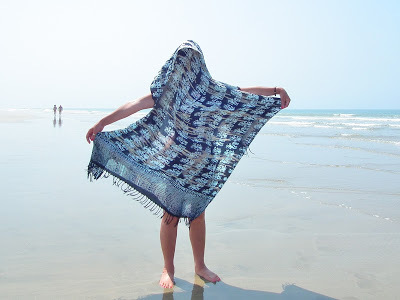
41. WHAT WOULD MAKE YOU HAPPIER THAN YOU ARE NOW? CARE TO SHARE?
Nah …
But I am very happy
42. ANYTHING YOU’D LIKE TO ADD?
Yes, people often say “never give up” and I don’t agree with that. Writers more than anybody need to know when to change direction. There is no point in just going on and on and on. I don’t call it giving up – it is changing direction, which is not really the same thing.
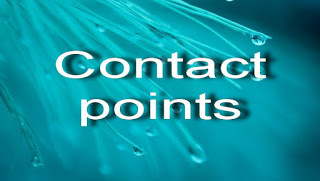
AMAZON

Clancy's comment: Go, Catherine. I loved your snappy answers. Thank you. Good luck with the new book.
I'm ...

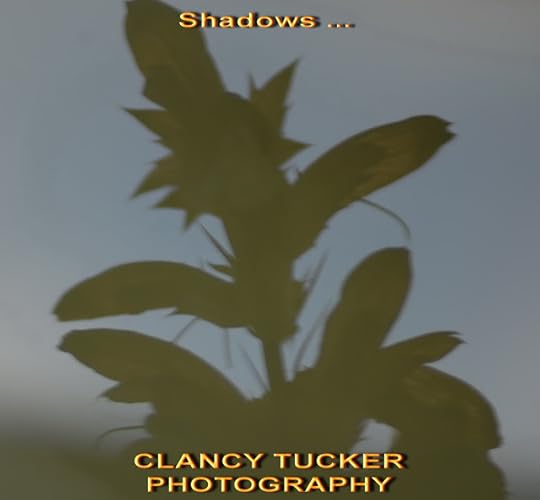
Published on October 16, 2015 03:16
October 15, 2015
16 October 2015 - COP THIS BRITISH SLANG

COP THIS BRITISH SLANG
G'day folks,
Welcome to some more British slang.
Easy Peasy - A childish term for something very easy. You might say it's a snap.
Engaged - When you ring someone and they are already on the phone you will get the engaged tone. In other words, they will be engaged. You would say you get the busy signal or the line is busy.
Excuse me - This is a great one! It's what kids are taught to say when they belch in public. We are also taught to say "pardon me" if we fart out loud. Unfortunately in American "excuse me" means you are encroaching in someone's personal space and you say "pardon me" when you don't hear someone properly. Imagine our surprise when we discovered that actually Americans are not belching and farting all the time.
Faff - To faff is to dither or to fanny around. If we procrastinated when getting ready for bed, as kids, our Dad use tell us we were faffing around.
Fagged - If you are too lazy or tired to do something you could say "I can't be fagged". It means you can't be Bothered.
Fagging - Fagging is the practice of making new boys at boarding schools into slaves for the older boys. If you are fagging for an older boy you might find yourself running his bath, cleaning his shoes or performing more undesirable tasks.
Fancy - If you fancy something then it means you desire it. There are two basic forms in common use - food and people. If you fancy a cake for example it means you like the look of it and you want to eat it. If you see someone of (hopefully) the opposite sex then you might fancy them if you liked the look of them and wanted to get to know them a little better!!!
Fanny - This is the word for a woman's front bits! One doesn't normally talk about anyone's fanny as it is a bit rude. You certainly don't have a fanny pack, or smack people on their fannys - you would get arrested for that! Careful use of this word in the UK is advised!
Fanny around - I'm always telling people to stop fannying around and get on with it. It means to procrastinate. Drives me mad!
Fiddle sticks - I have an old Aunt who is much too well mannered to swear. So when the need arises for a swear word, she will substitute "fiddle sticks".
Filch - To filch is to steal or pilfer. The origin is apparently unknown.
Fit - Fit is a word that I have heard a lot recently - it seems to be making a comeback. A fit birdmeans a girl who is pretty good looking or tasty! A fit blokewould be the male equivalent.
Flog - To Flog something is to sellit. It also means to beat something with a whip, but when your wife tells you she flogged the old TV it is more likely she has sold it than beaten it (hopefully!).
Fluke - If something great happened to you by chance that would be a fluke. When I was a kid my Mum lost her engagement ring on the beach and only realised half way home. We went back to the spot and she found it in the sand. That was a fluke.
Flutter - I like to have a flutter on the horses. It means to have a bet, usually a small one by someone who is not a serious gambler.
Fortnight - Two weeks. Comes from an abbreviation of "fourteen nights". Hence terms like "I'm off for a fortnights holiday" meaning "I am going on a two week vacation".
Fruity - If someone is feeling fruity then they are feeling frisky. Watch out!

Clancy's comment: Well, you guys must know a few of these by now. Wait, there are more to come. Feel free to filch any of these to send onto friends.
I'm ...


Published on October 15, 2015 01:58
October 14, 2015
15 October 2015 - IDEAS FOR FICTION WRITERS

IDEAS FOR FICTION WRITERS
G'day folks,
Here are some more tips from two famous writers. Hope they help you.
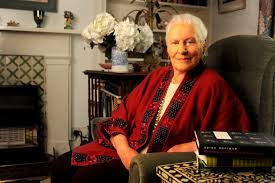
Diana Athill
1 Read it aloud to yourself because that's the only way to be sure the rhythms of the sentences are OK (prose rhythms are too complex and subtle to be thought out – they can be got right only by ear).
2 Cut (perhaps that should be CUT): only by having no inessential words can every essential word be made to count.
3 You don't always have to go so far as to murder your darlings – those turns of phrase or images of which you felt extra proud when they appeared on the page – but go back and look at them with a very beady eye. Almost always it turns out that they'd be better dead. (Not every little twinge of satisfaction is suspect – it's the ones which amount to a sort of smug glee you must watch out for.)
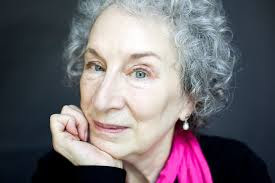
Margaret Atwood
1 Take a pencil to write with on aeroplanes. Pens leak. But if the pencil breaks, you can't sharpen it on the plane, because you can't take knives with you. Therefore: take two pencils.
2 If both pencils break, you can do a rough sharpening job with a nail file of the metal or glass type.
3 Take something to write on. Paper is good. In a pinch, pieces of wood or your arm will do.
4 If you're using a computer, always safeguard new text with a memory stick.
5 Do back exercises. Pain is distracting.
6 Hold the reader's attention. (This is likely to work better if you can hold your own.) But you don't know who the reader is, so it's like shooting fish with a slingshot in the dark. What fascinates A will bore the pants off B.
7 You most likely need a thesaurus, a rudimentary grammar book, and a grip on reality. This latter means: there's no free lunch. Writing is work. It's also gambling. You don't get a pension plan. Other people can help you a bit, but essentially you're on your own. Nobody is making you do this: you chose it, so don't whine.
8 You can never read your own book with the innocent anticipation that comes with that first delicious page of a new book, because you wrote the thing. You've been backstage. You've seen how the rabbits were smuggled into the hat. Therefore ask a reading friend or two to look at it before you give it to anyone in the publishing business. This friend should not be someone with whom you have a romantic relationship, unless you want to break up.
9 Don't sit down in the middle of the woods. If you're lost in the plot or blocked, retrace your steps to where you went wrong. Then take the other road. And/or change the person. Change the tense. Change the opening page.
10 Prayer might work. Or reading something else. Or a constant visualisation of the holy grail that is the finished, published version of your resplendent book.

Clancy's comment: Hope these have helped you, or at least reminded you of a few things.
I'm ...

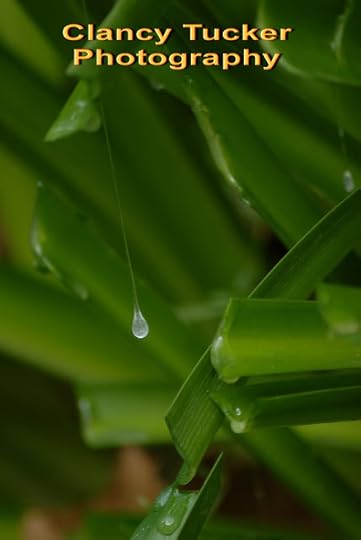
Published on October 14, 2015 05:47
October 13, 2015
14 October 2015 - WHY ARE BRITISH POLICE CALLED BOBBIES?
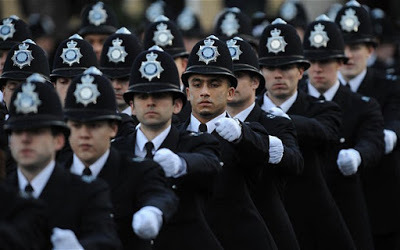
WHY ARE BRITISH POLICECALLED BOBBIES?
G'day folks,
Ever been to the UK and spoken to a policeman? I have. They are called Bobbies, but do you know why? Read on ....
The concept of modern policing has its roots in pre-Victorian England, when the British home minister, Sir Robert Peel (1778-1850), oversaw the creation of London’s first organized police force. Before Peel’s 1829 reforms, public order had been maintained by a mix of night watchmen, local constables and red-coat-wearing army soldiers, who were deployed as much to quell political troubles as to deal with local crime.
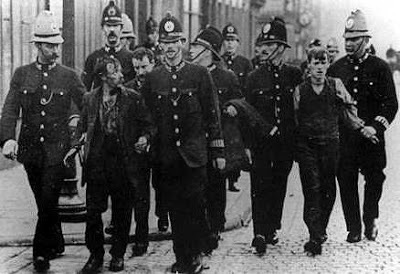
In creating London’s Metropolitan Police (headquartered on a short street called Scotland Yard), Peel sought to create a professionalized law enforcement corps that was as accountable to everyday citizens as to the ruling classes. When Peel’s opponents complained that the creation of the new police force would restrict personal liberties, Peel responded, “I want to teach people that liberty does not consist in having your house robbed by organized gangs of thieves, and in leaving the principal streets of London in the nightly possession of drunken women and vagabonds.”

Instead of the resented red coats, Peel’s patrolmen wore black jackets and tall wool hats with shiny badges. They went out armed only with a short club and a whistle for summoning backup, walking regular beats and working to gain the trust of the local citizens. Robert Peel’s system was a success, and by the mid-19th century large American cities had created similar police forces. In London, the policemen were so identified with the politician who created them that they were referred to as “Peelers” or—more memorably—“Bobbies,” after the popular nickname for Robert.

Clancy's comment: There ya go. Now you know.
I'm ...

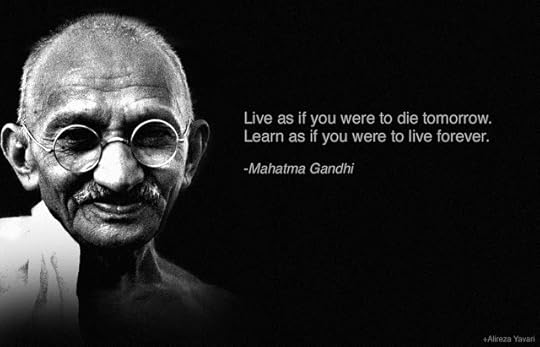
Published on October 13, 2015 02:54
October 12, 2015
13 October 2015 - TWO 5-STAR AMAZON REVIEWS FOR 'KY!'
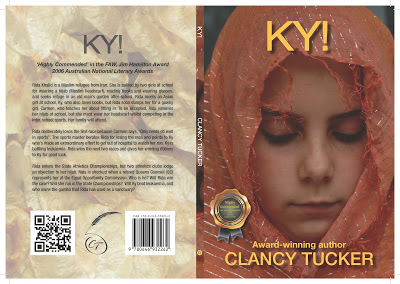
TWO 5-STAR AMAZON REVIEWS FOR 'KY!'
G'day folks,
Well, believe it or not, I received two 5-star Amazon reviews for one of my books on the same day. Both reviews have been provided by well-established authors; women I respect greatly - Vicki Tyley and Sarah Mallery. Thank you ladies. Love ya work!
SARAH MALLERY'S REVIEW:
Schoolyard bullying has been around for far too many years––brutal, heart-breaking, and often permanently damaging. The perpetrators thrive on power and the victims either can become so depressed they lean towards suicide or lash out, killing themselves or people around them.
But what if a victim rises above the situation with the support of a couple of people? What if he/she gets outside of his/her life by thinking of someone with even greater issues? That's exactly what happens to Rida, a young girl from Iran, after she's been accosted by heavy prejudice and hatred; when by just wearing her hijab she fears for her own safety.
There are some very important lessons in this book, but what also impressed me was not just its inspirational messages, but also how Clancy Tucker relates the step-by-step process a victim goes through when they are preyed upon. How they often spend hours thinking up ways to avoid conflict, whether it be by keeping their school locker open so they can grab their backpack immediately after their classes to quickly "go on the run," or looking for hiding places en route to their homes in case they are being followed, or, in this case, taking off her hijab just before she gets to school to lessen the attention it draws.
I believe for YA readers, displaying this thought process is very important for them, to assure them if they themselves are constantly problem-solving they, indeed, are not alone. Highly recommended.
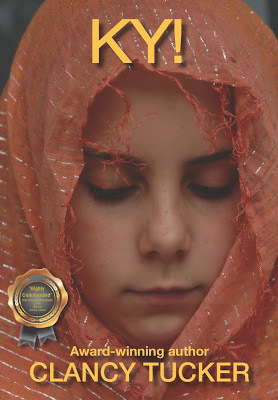
VICKI TYLEY'S REVIEW:
“Reading books had always been the best way for Rida to learn, and to escape from reality. In the detention centre, she’d read to take her mind off the intolerable heat, the endless kilometres of red sand and the razor wire. Now, she read to avoid two bullies who didn't like her. Rida was the only Muslim at her school, and wearing a hijab made her stand out. Wearing glasses didn't help either.” – Ky!
The schoolyard can be a scary place, and even more so if you’re different in any way from your classmates. And so it is for Rida, the only Muslim in her school.
The story of Ky! is told in an engaging and easy reading style, but underpinning it all are strong messages about bullying, multi-culturalism, illness, courage, and fortitude. But more than anything, it was the strength of the relationships on all levels that touched me most.
This is a book aimed at teenagers, but I wouldn't hesitate to recommend it to adult readers as well.

SARAH MALLERY
VICKI TYLEY

Clancy's comment: I am pleased about these reviews. Indeed I am. However, don't forget that it also won an award in the Australian National Literary Awards. This novella covers many issues, but it is mainly about bullying. Whilst writing this story, I tried to offer some clues for teenagers on how to deal with the bullies. Having said that, I agree with Vicki Tyley. I would highly suggest this book for adults as well. You may just learn why your child or grandchild has been acting differently lately.
Might be a good buy for Christmas. So, don't be shy, head up to my book shop and buy a paperback or e-Book.
Thank you, Sarah! Thank you, Vicki! Love ya work.
I'm ...


Published on October 12, 2015 02:16



